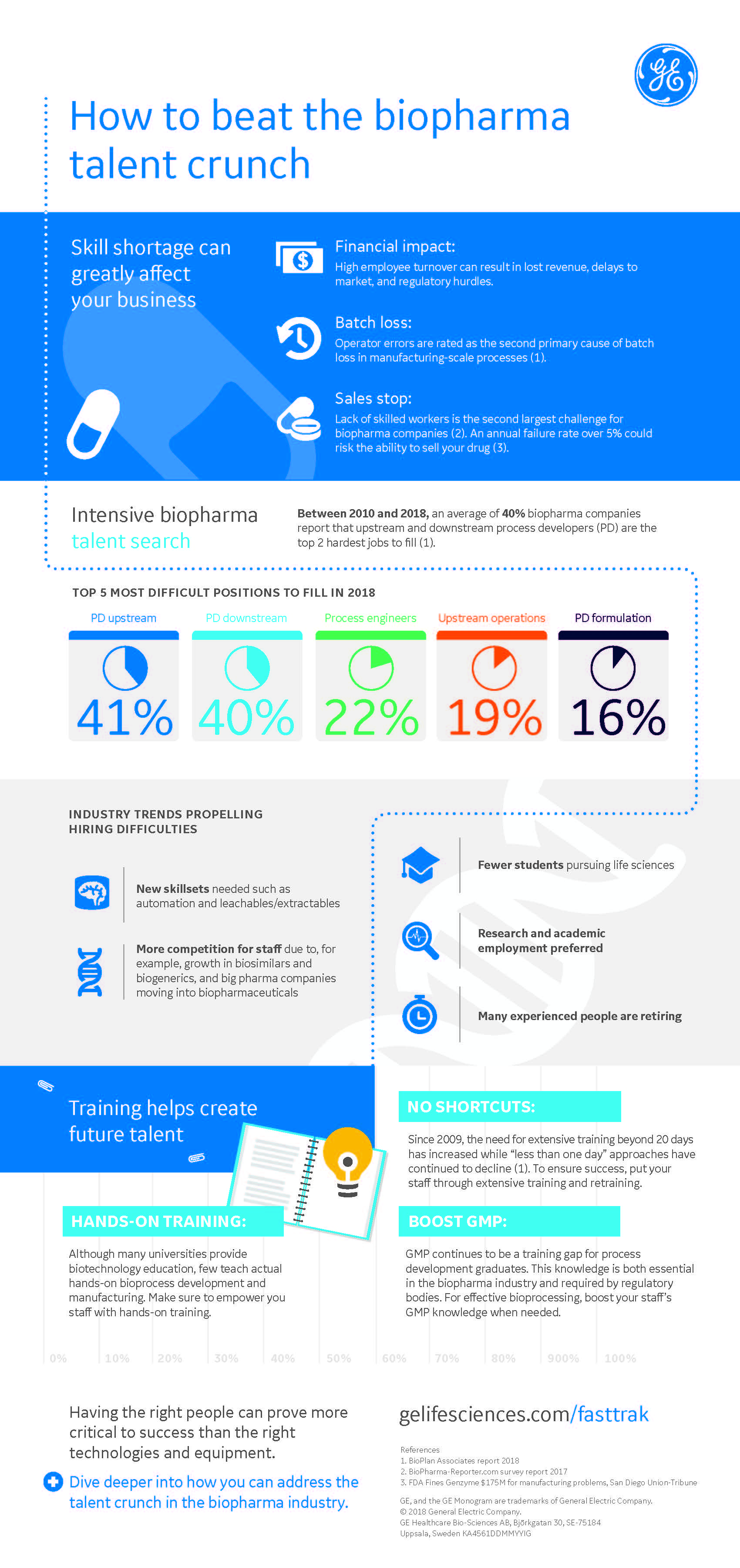Sponsored Content Brought to you by
Advances in bioprocessing over the last couple of decades have resulted in an increasingly complex and diverse biopharma market with new opportunities to treat unmet medical needs. At the same time, economic and population growth in regions across the world are paving the way for more companies to expand their global footprint. Yet, as this evolution energizes the industry, it also creates a demand for more skilled resources from a talent pool that seems to be draining faster than it can fulfill. So what strategies should your company consider for recruiting, training, and retaining qualified candidates in order to remain competitive in a burgeoning biopharma market?
Developing Talent for the Future of Biologics
Several trends shaping the future of biopharma will have a direct impact on workforce development. First, a 2018 report from BioPlan Associates estimates there are well over 10,000 therapeutics in R&D, both drugs (chemical substance pharmaceuticals) and biopharmaceuticals (biotechnology-derived pharmaceuticals), with nearly 40,000 ongoing (or recently reported) clinical trials. Among these, a significant portion, >1,400, of products in the development pipeline are follow-on biopharmaceuticals, mostly biosimilars and biobetters in major markets and many biogenerics in developing countries and international commerce.1 These follow-on products are disrupting the biomanufacturing landscape by changing how we approach the development and commercialization of biologics. Biomanufacturers can now utilize more cost-effective development processes to produce biosimilars for some of the industry’s highest-revenue monoclonal antibody drugs, which typically rely on less economical legacy production methods. In addition, advances in cell and gene therapies are predicted to disrupt the biomanufacturing industry, requiring new techniques and technologies to be established.2
The BioPlan Associates report points to production operations as the most sought after skillsets in biopharma. The practical, hands-on knowledge of how to complete tasks, such as setting up, operating, and breaking down biomanufacturing machinery, is essential to facility operations. With limited training programs producing high-quality candidates in the U.S. or even worldwide, companies are working vigorously to retain their most seasoned employees to bridge this critical gap in supply and demand.
The focus on increased productivity and lower costs in modern biomanufacturing is also impacting workforce development. As the need for process development expertise increases, biopharma companies are finding it difficult to fill these positions, with 40.8 percent reporting upstream process development as the most difficult position to fill and 40 percent reporting downstream process development as its most challenging hiring area. As companies continue to expand globally and domestically, production demands increase for suppliers building new solutions and technologies. A wider range of bioprocess expertise is needed to integrate and operate process innovations such as continuous biomanufacturing, high throughput process development (HTPD), and Quality by Design (QbD) studies.
Emerging markets across the world are witnessing significant growth, as an expanding middle class in those territories is calling for higher-quality drugs. As a result of favorable government policies and taxes, as well as regulatory requirements to keep drug development in country, investments are being made in key areas like China, Korea, India, and Singapore. Thus, Asia is expected to command 24 percent of global mammalian capacity by 2021 versus its 16 percent in 2016.3Clearly, companies that want to take advantage of the opportunities in these parts of the world must be aware of the obstacles they may face when seeking to employ local talent for facility operations.
Biopharma Challenge of China: What You Need to Know
Due to a rapidly aging society and a strict one-child policy, China now has the world’s second largest economy and is considered the most important growth market in the biopharmaceutical industry.1 Therefore, as in the U.S., there is a critical need to figure out ways of developing talent there. A combination of several efforts are currently being made in China to boost its share of highly skilled employees, such as its National Talent Development Plan created by the Central Committee of the Chinese Communist Party (CCP) and the State Council.4 The goal of the plan is to increase this subset of the labor force from 24 percent to 28 percent by 2020.5 In addition, universities and colleges in China are starting to set up dedicated bioengineering or biopharmaceutical departments in an effort to deliver enough young graduates, and the government is seeking to bring back students who studied abroad.
Additionally, retaining staff in China is equally difficult. Cultural poaching is prevalent in emerging urban locales and even neighboring nations, where wage wars are common in an increasingly competitive market. This leads to lower employee engagement and high turnover rates. Another hurdle is aligning with the culture in emerging market territories. Managers interacting with local city, state, and national administrations for permits and other in-country requirements will encounter cultural barriers, such as foreign languages. It would be impossible to set up in China, for example, if you are not able to communicate with potential candidates and/or government authorities. Planning in advance and partnering with a local corporation can help to overcome these regional-specific hurdles. Choose a regional partner that:
- Is focusing on the healthcare sector and is vertically integrated,
- has established development and manufacturing operations and a recognized brand,
- has struck relationships with local, state, and federal authorities,
- and who understands the local culture.
Retaining a Biopharma Talent Pipeline
Once you develop a strategy to acquire qualified candidates, the next task is coming up with a plan for how to keep them. Preparing a talent engine within your company that helps you prepare for the expected turnover with competitive salaries and benefits is always appealing, but you must also make sure you are creating a career path for your employees. They want to see how they can advance in the company and what goals have to be met for that to happen. Complete career development plans to assess each individual’s skills and where they want to go in their profession. Then outline any existing gaps and offer specialized training, so they can attain the ability to fulfill job requirements for higher-level positions and give them opportunities to demonstrate those newly-acquired skills. Those employees who have spent a career in bioprocessing are the most sought after, as a high-quality engineer can be very valuable to a company. Strong incentives should be offered in order to retain them. A company culture built on people development and meritocracy ensures you attract and retain the right talent engine to secure ongoing operations.
While training can be achieved externally, this often requires time away from the office, travel expenses, and tuition. The most efficient way for employees to build new skills is through internal training. Look for an industry leader in your corner of the market that provides training seminars inside the walls of your company. For example, GE Healthcare’s Fast Trak Training and Education program offers guidance from expert instructors, where trainees can apply design concepts in a training applications lab or pilot plant with real manufacturing equipment. They can then apply that practical understanding in real manufacturing operations. Whatever training program you do select must have the right technical depth and emphasis for biomanufacturing. And with the need for multidisciplinary skills in bioprocessing growing as the complexity of molecules increases, training for new operations or manufacturing employees can no longer be completed in just a few days or even weeks. Since 2009, the need for extensive training beyond 20 days has increased while “less than one day” approaches have continued to decline.2 Dedicating more time to training can result in many areas of improvement, including fewer failures in process development and optimization as well as deviations in manufacturing and/or quality issues.
Good manufacturing practices (GMP) continues to be a training gap for process development graduates, as the quality principles around GMP established by regulatory agencies are not taught in most bioengineering education programs. Not only is this knowledge essential to those working in clinical or commercial manufacturing plants, but the FDA and EMA also want to see GMP training records for all employees involved in manufacturing, quality control testing of drugs, and quality assurance systems. GMP training is not required for those working in labs or pilot plants, as drugs are not being made there for patient distribution. However, it is a good skill for these individuals to have, so they can ensure the manufacturing process they are developing conforms to GMP guidelines.
Biomanufacturing: The Cost of Unskilled Workers
Without the appropriate talent as well as advanced and routine training programs, your employees’ capabilities may not be strong enough to execute both process development and manufacturing operations. This gap can slow the progress and commercialization of your molecule. The consequence of having unskilled workers can also be detrimental to your company’s bottom line, as an error on even one small batch can cost an organization millions of dollars.
If the mistake occurs in a commercial manufacturing plant, it can be far more serious. The regulatory agency that issued the facility’s license requires an annual report that includes all failed batches, and if the failure rate is more than 5 percent, the plant could be at risk of losing the ability to sell its drug.6
Developing a rich pipeline of biopharma talent at your company that is dedicated to long-term employment is directly related to the probability of success of your company. Building a solid foundation for success starts with improving the capabilities of your employees and strengthening their future confidence in your organization.
References:
1. BioPlan Associates, 2018 Report and Survey of Biopharmaceutical Manufacturing Capacity and Production
2. BioPharma-Reporter.com, Survey Report: State of the global biomanufacturing and bioprocessing industry 2017
3. American Pharmaceutical Review, Global Biomanufacturing Trends, Capacity, and Technology Drivers: Industry Biomanufacturing Capacity Overview
4. Brookings, China’s National Talent Plan: Key Measures and Objectives
5. BCG, Four Ways to Stop Worrying About Talent in China
6. San Diego Union-Tribune, FDA Fines Genzyme $175M for manufacturing problems
About Fast Trak Training & Education
GE Healthcare has Fast Trak training centers in the USA, Sweden, India, South Korea and China and satellite centers in Turkey, Japan and Singapore. The centers are equipped with the latest technologies for bioprocessing in an environment and at a scale that closely replicates the real-life industrial setting. For over 30 years, thousands of customers world-wide have been trained by GE’s experienced Fast Trak leadership teams. Contact GE for more information.




